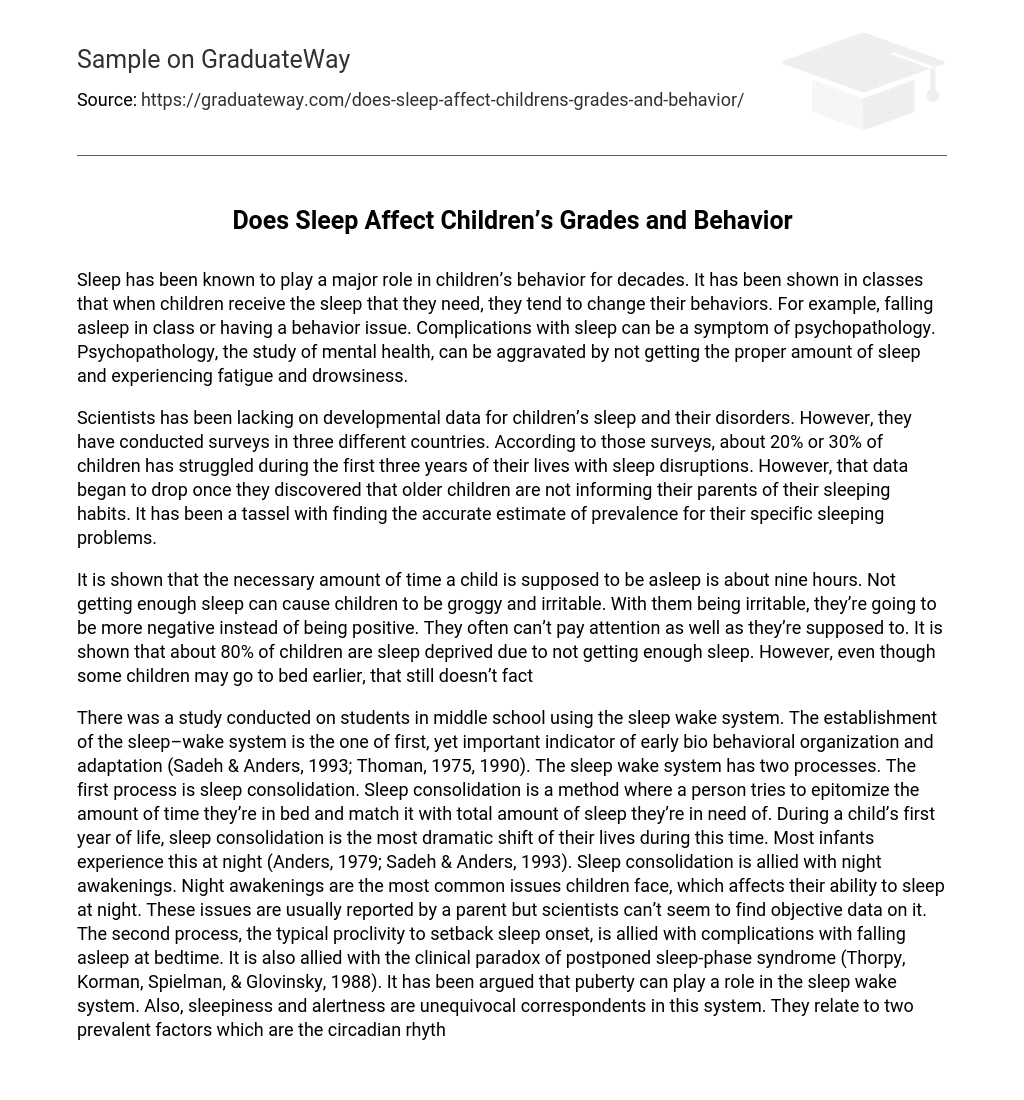Sleep has been known to play a major role in children’s behavior for decades. It has been shown in classes that when children receive the sleep that they need, they tend to change their behaviors. For example, falling asleep in class or having a behavior issue. Complications with sleep can be a symptom of psychopathology. Psychopathology, the study of mental health, can be aggravated by not getting the proper amount of sleep and experiencing fatigue and drowsiness.
Scientists has been lacking on developmental data for children’s sleep and their disorders. However, they have conducted surveys in three different countries. According to those surveys, about 20% or 30% of children has struggled during the first three years of their lives with sleep disruptions. However, that data began to drop once they discovered that older children are not informing their parents of their sleeping habits. It has been a tassel with finding the accurate estimate of prevalence for their specific sleeping problems.
It is shown that the necessary amount of time a child is supposed to be asleep is about nine hours. Not getting enough sleep can cause children to be groggy and irritable. With them being irritable, they’re going to be more negative instead of being positive. They often can’t pay attention as well as they’re supposed to. It is shown that about 80% of children are sleep deprived due to not getting enough sleep. However, even though some children may go to bed earlier, that still doesn’t fact
There was a study conducted on students in middle school using the sleep wake system. The establishment of the sleep–wake system is the one of first, yet important indicator of early bio behavioral organization and adaptation (Sadeh & Anders, 1993; Thoman, 1975, 1990). The sleep wake system has two processes. The first process is sleep consolidation. Sleep consolidation is a method where a person tries to epitomize the amount of time they’re in bed and match it with total amount of sleep they’re in need of. During a child’s first year of life, sleep consolidation is the most dramatic shift of their lives during this time. Most infants experience this at night (Anders, 1979; Sadeh & Anders, 1993). Sleep consolidation is allied with night awakenings. Night awakenings are the most common issues children face, which affects their ability to sleep at night. These issues are usually reported by a parent but scientists can’t seem to find objective data on it. The second process, the typical proclivity to setback sleep onset, is allied with complications with falling asleep at bedtime. It is also allied with the clinical paradox of postponed sleep-phase syndrome (Thorpy, Korman, Spielman, & Glovinsky, 1988). It has been argued that puberty can play a role in the sleep wake system. Also, sleepiness and alertness are unequivocal correspondents in this system. They relate to two prevalent factors which are the circadian rhythm and sleep debt. The circadian rhythm is also known as body clock. It’s a twenty four hour cycle that make changes in your physical, mental, and behavioral being on the daily. The circadian rhythm is important because it mobilize daily variations in alertness and promotes heightened alertness during the morning and afternoon hours. During the nocturnal and noon hours, alertness is diminished (Borbely, 1994). The sleep debt mirrors the measure of sleep procured, its element, and the time elapsed from the last sleep episode (Borbely, 1994).
Sleep disruption research has been automatically constrained by two technological disadvantages. The first disadvantage is based on subjective data or polysomnographic studies, which studies sleep. Subjective reports usually comes from the child or their parents and happens to be the most common used method. The reports are demonstrated to be limited based on restricted and biased information they have about their sleeping habits. . Polysomnography provides thorough information about sleep. The second impediment is an absence of clear stipulation for elucidating a sleep disruption. This absence is exceptionally inevitable with knowledge of the fact that most sleep problems are acquiescent to dispassionate quantification. These specifications accentuate the idiosyncratic complaint but do not provide more unambiguous benchmarks that would accost the assorted factors of what a sleep problem really is. For instance, the amount of awakenings each night, disrupted nights each week, or the continuation of the night awakenings that would complement a dispassionate momentous disorder.
Another study was conducted and their goal was to examine essential sleep patterns using actigraphy, an implementation of audit human rest and activity cycles. The goal is to evaluate and corroborate the following: age differences in sleep schedule and sleep quality, sleep disruptions in children as assessed by objective measures and precise definitions, subjective sleepiness and its relationships with objective measures of sleep, and the relationships between objective sleep measures and psychosocial measures (Sadeh, A., Raviv, A., & Gruber, R, 2000).
One hundred forty children cooperated in the study. That is seventy two boys and sixty eight girls. The children were sampled were in three contrasting youth groups such as second grade, fourth grade, and sixth grade. Most of the children come from families of two parents with middle or upper middle-class socioeconomic status.
Their results summit noteworthy advancement procedures in the sleep–wake system throughout the children’s lives and distribute regularizing statistics on sleep patterns and sleep disruptions. The outcome also height on the affiliation between sleep and idiosyncratic daytime sleepiness. Scientists has come across advanced set of findings which includes fair indications that despite the fact sleep schedule and sleep quantity vary with age, sleep quality endures momentously balanced within this specific age group. Simultaneously, significant gender differences were determined. The predominance of sleep disruptions was appraised with the usage of an advanced definition based on objective equitable of sleep quality (Sadeh, A., Raviv, A., & Gruber, R, 2000).





